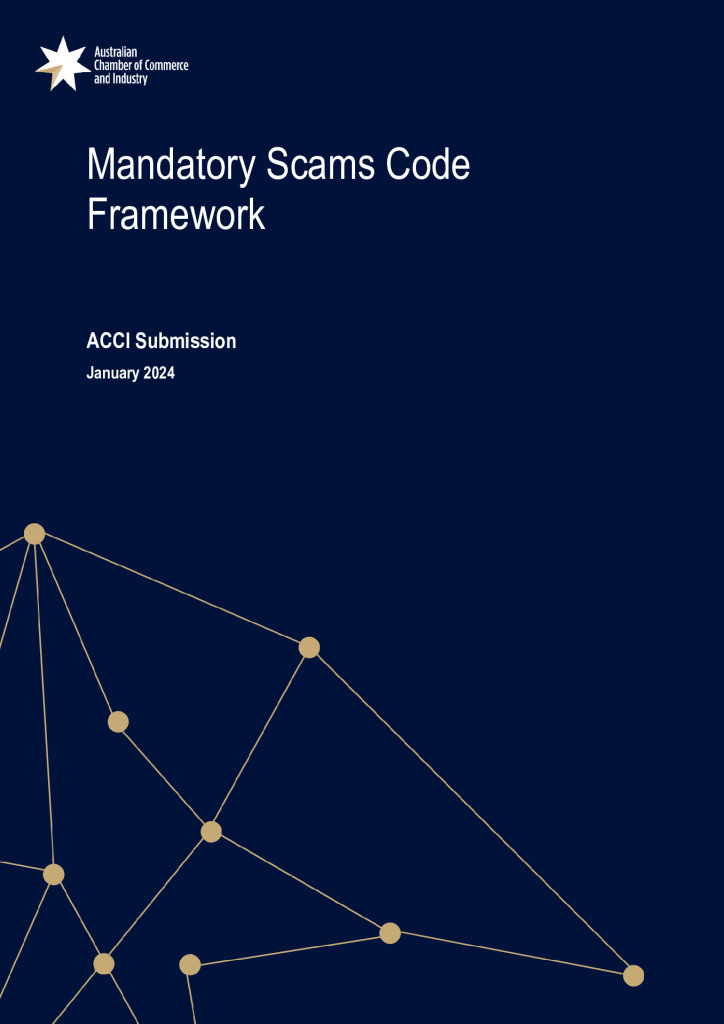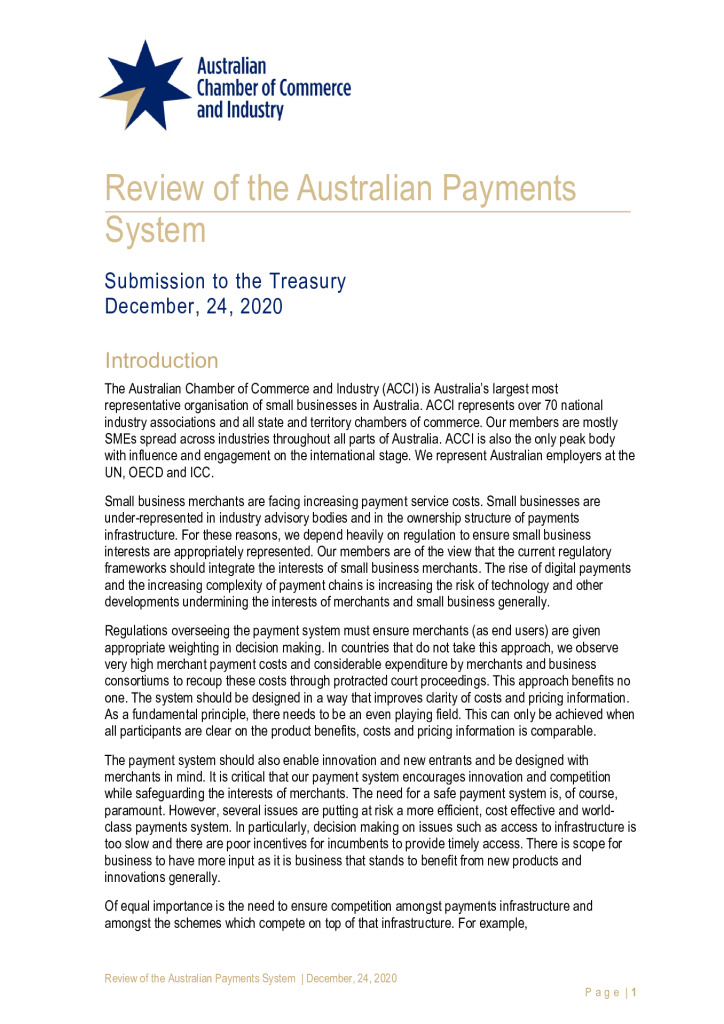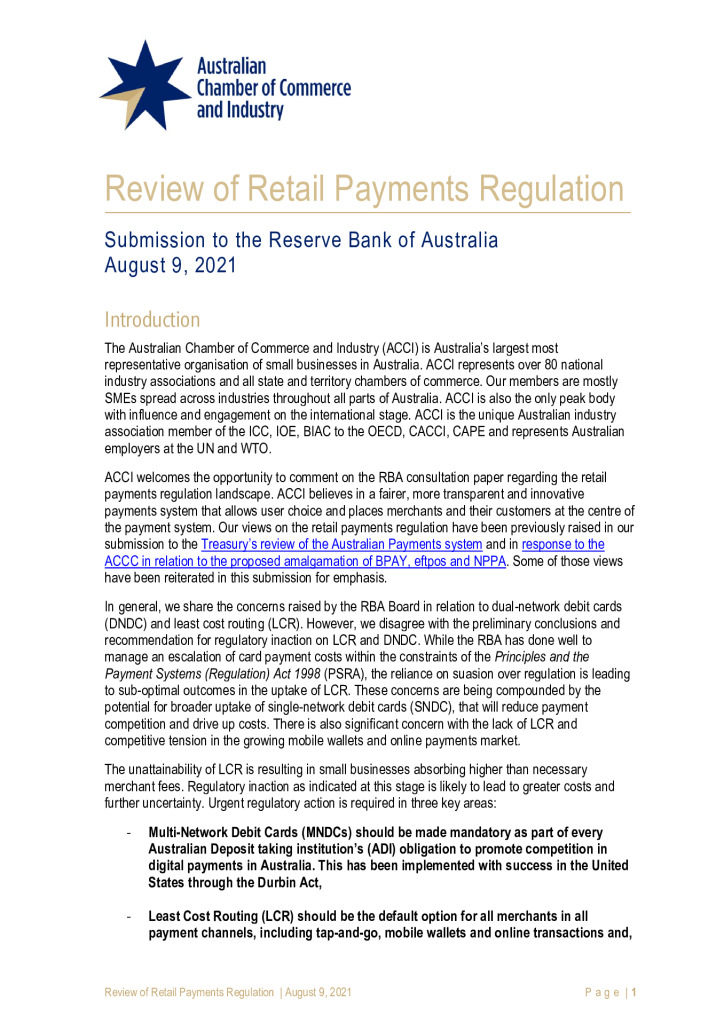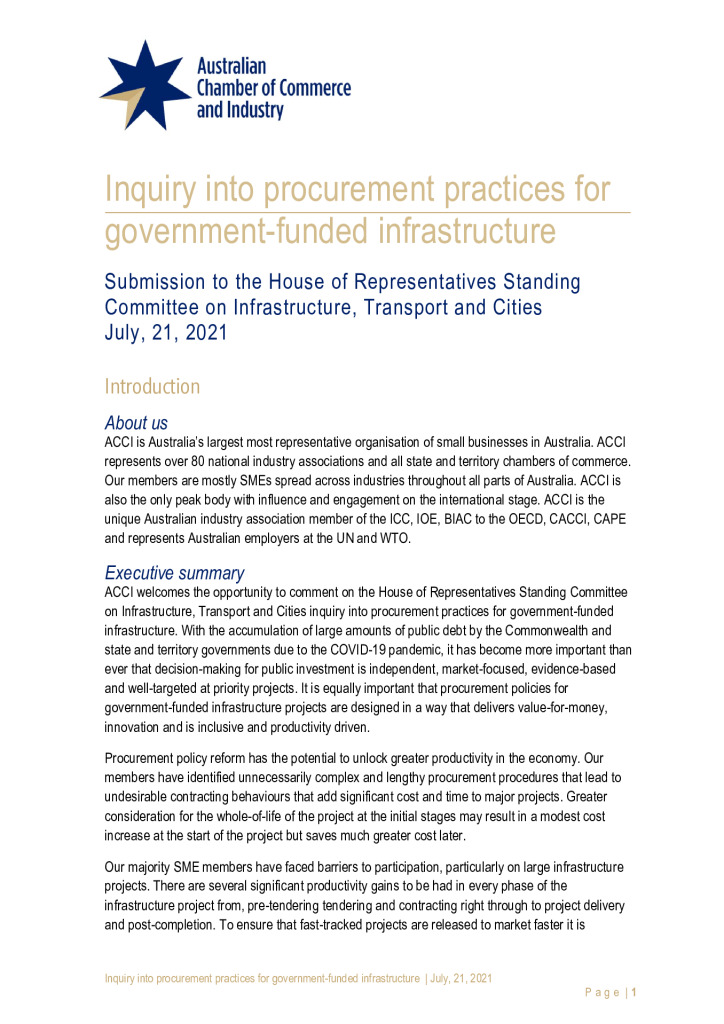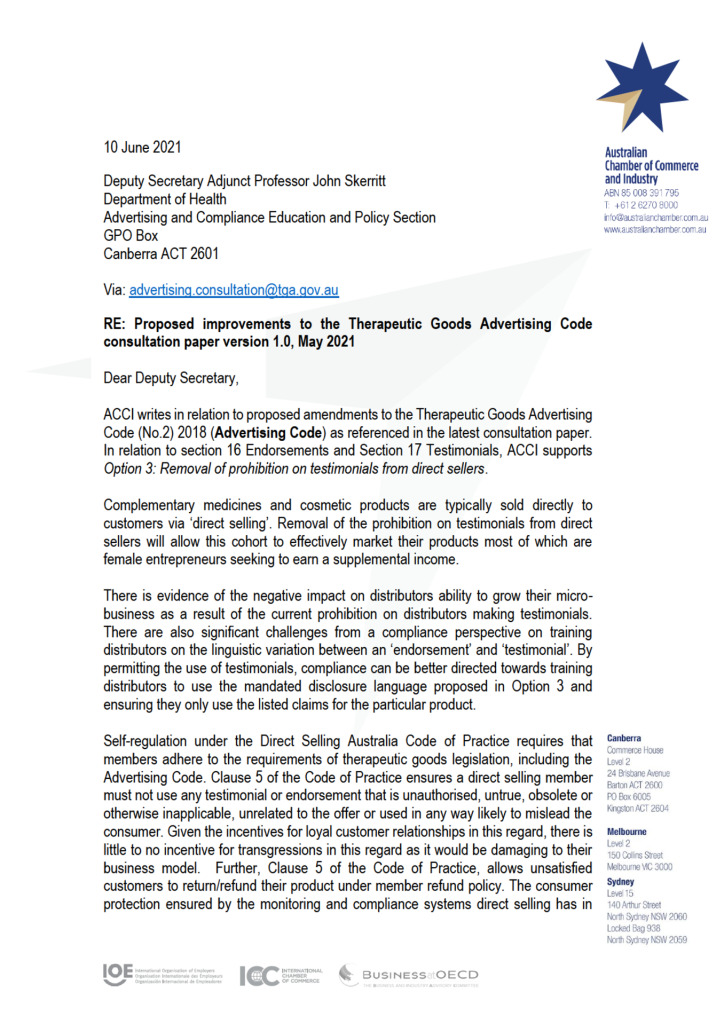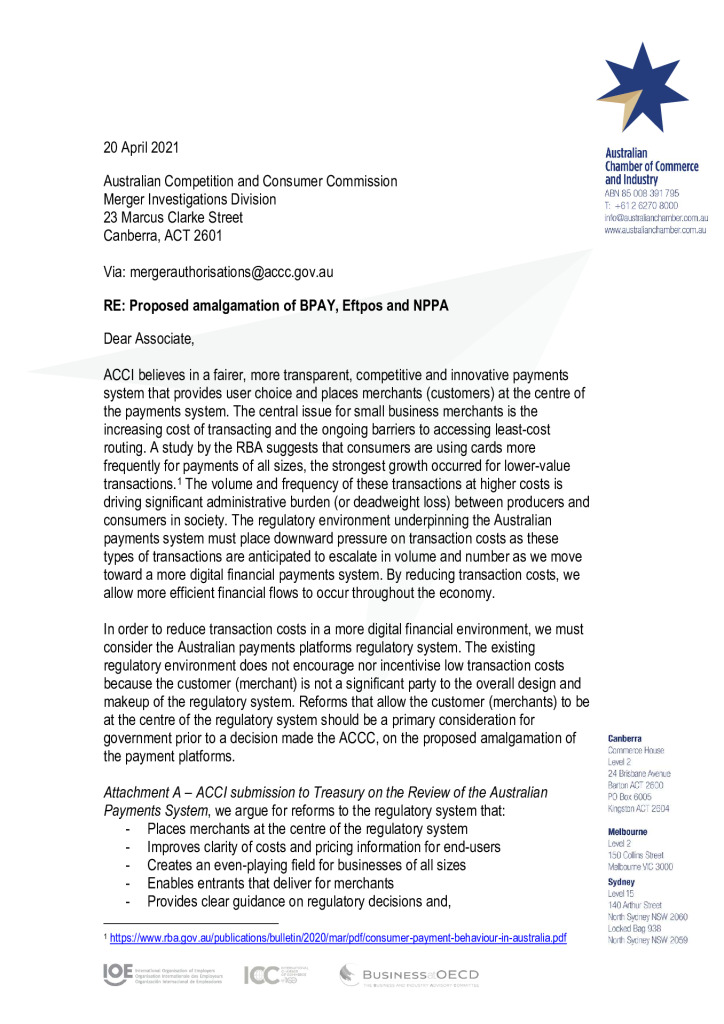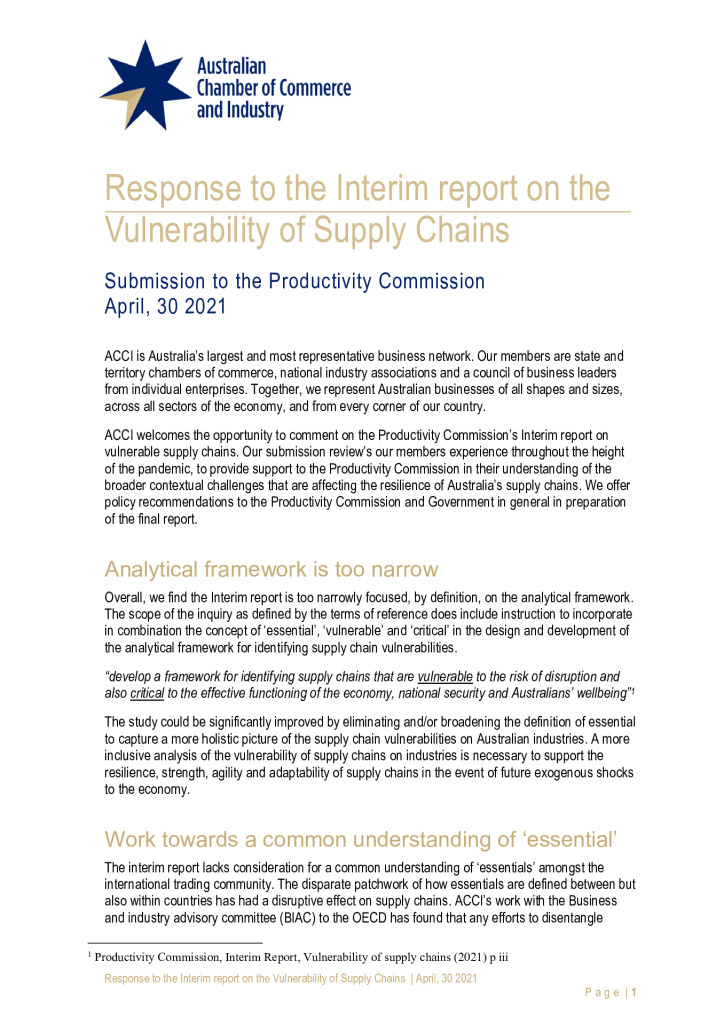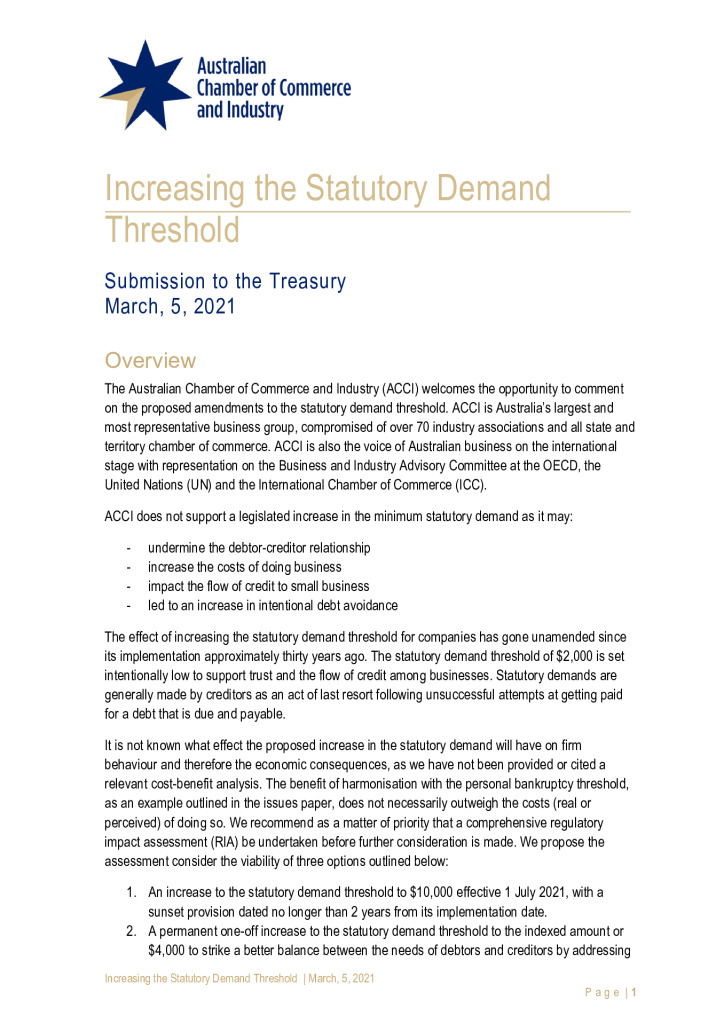Member Login
Small Business
See below for submissions related to small business.
Mandatory Scams Code Framework
The impact of scams on Australians every year is significant, and we are strongly supportive of measures to prevent them from occurring. We support the objective of the proposed framework, being to “make Australia a harder target for scam activity, and less attractive to scammers”. However, we do not believe that the proposed legislative framework is the appropriate mechanism to achieve this.
Review of the Franchising Code of Conduct
Small businesses are currently grappling with escalating operational
expenses, diminishing business confidence, and limited time and resources. They are already
contending with a progressively intricate industrial relations framework while being expected
to uphold their obligations to employees amid changing laws and regulations while
simultaneously managing their businesses. Given that the majority of businesses in the
franchise sector are small, ACCI does not advocate for additional reporting requirements
under the Code at this juncture.
Proposed amalgamation of BPAY, eftpos and NPPA – proposed undertaking
ACCI is pleased that the ACCC has acknowledged a number of issues in its Statement of Preliminary Views released on 4 June 2021 and its 6 August 2021 Invitation to Interested Parties in relation to the proposed undertaking. In particular, the ACCC’s 6 August Invitation refers to concerns that the proposed amalgamation may mean a decrease in availability of LCR and reduced support for eftpos. ACCI shares the ACCC’s concerns and, as stated in our submission on 20 April 2021, we believe there is a real risk that the proposed merger may in fact increase the transaction costs of digital payments across the economy. The increase in transaction costs are being absorbed by a cash poor and cash sensitive small business community significantly impacted and stressed by the ongoing COVID-19 pandemic. Now is certainly not the time to place at risk a low-cost payment rail, particularly when a greater proportion of businesses are accepting online and digital payments from their customers.
Review of the Australian Payments System
Small business merchants are facing increasing payment service costs. Small businesses are under-represented in industry advisory bodies and in the ownership structure of payments infrastructure. For these reasons, we depend heavily on regulation to ensure small business interests are appropriately represented. Our members are of the view that the current regulatory frameworks should integrate the interests of small business merchants. The rise of digital payments and the increasing complexity of payment chains is increasing the risk of technology and other developments undermining the interests of merchants and small business generally.
Download
147719_acci_0
PDF 522.43 KB
Review of Retail Payments Regulation
ACCI welcomes the opportunity to comment on the RBA consultation paper regarding the retail payments regulation landscape. ACCI believes in a fairer, more transparent and innovative payments system that allows user choice and places merchants and their customers at the centre of the payment system. Our views on the retail payments regulation have been previously raised in our submission to the Treasury’s review of the Australian Payments system and in response to the ACCC in relation to the proposed amalgamation of BPAY, eftpos and NPPA. Some of those views have been reiterated in this submission for emphasis.
Download
acci-2021-07-09
PDF 545.6 KB
Inquiry into procurement practices for government-funded infrastructure | Submission to the House of Representatives Standing Committee on Infrastructure, Transport, and Cities
ACCI welcomes the opportunity to comment on the House of Representatives Standing Committee on Infrastructure, Transport and Cities inquiry into procurement practices for government-funded infrastructure. With the accumulation of large amounts of public debt by the Commonwealth and state and territory governments due to the COVID-19 pandemic, it has become more important than ever that decision-making for public investment is independent, market-focused, evidence-based and well-targeted at priority projects. It is equally important that procurement policies for government-funded infrastructure projects are designed in a way that delivers value-for-money, innovation and is inclusive and productivity driven.
Consultation Paper of Proposed Improvements to the Therapeutic Goods Advertising Code Version 1.0, May 2021
ACCI writes in relation to proposed amendments to the Therapeutic Goods Advertising Code (No.2) 2018 (Advertising Code) as referenced in the latest consultation paper. In relation to section 16 Endorsements and Section 17 Testimonials, ACCI supports Option 3: Removal of prohibition on testimonials from direct sellers.
Australian Small Business and Family Enterprise Ombudsman (ASBFEO) Review
ACCI have found the ASBFEO has continued to effectively undertake its advocacy and assistance function to the benefit of the small business community. The ABSFEO has remained independent and impartial in undertaking its current functions and has done well in prioritising and, acting to resolve, matters of priority concern raised by Australian small businesses.
Proposed amalgamation of BPAY, EFTPOS and NPPA
ACCI believes in a fairer, more transparent, competitive and innovative payments system that provides user choice and places merchants (customers) at the centre of the payments system. The central issue for small business merchants is the increasing cost of transacting and the ongoing barriers to accessing least-cost routing.
Response to the Interim report on the Vulnerability of Supply Chains | Submission to the Productivity Commission
ACCI welcomes the opportunity to comment on the Productivity Commission’s Interim report on vulnerable supply chains. Our submission review’s our members experience throughout the height of the pandemic, to provide support to the Productivity Commission in their understanding of the broader contextual challenges that are affecting the resilience of Australia’s supply chains. We offer policy recommendations to the Productivity Commission and Government in general in preparation of the final report.
Increasing the Statutory Demand Threshold | Submission to the Treasury
The effect of increasing the statutory demand threshold for companies has gone unamended since its implementation approximately thirty years ago. The statutory demand threshold of $2,000 is set intentionally low to support trust and the flow of credit among businesses. Statutory demands are generally made by creditors as an act of last resort following unsuccessful attempts at getting paid for a debt that is due and payable.

